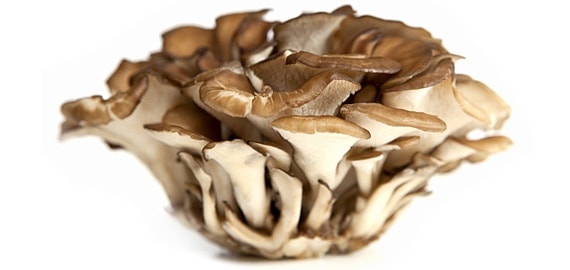
Written By: Gloria Tsang, RD
Title: Founding Registered Dietitian
Alumni: University of British Columbia
Last Updated on:

The maitake mushroom is a large mushroom native to North America, Europe, and Japan. The Japanese name “maitake” literally means “dancing mushroom.” It is also referred to by the English name “hen of the woods” because of its substantial size and unique shape. Maitake mushrooms have been used as both food and medicine in Asian cultures for many centuries, and are described as having a rich, earthy taste. In North America, fresh and dried maitake mushrooms are available at some grocery stores and markets, and the extract maitake D-fraction is sold as a dietary supplement.
1 oz of fresh maitake mushroom contains:

Maitake mushrooms have been used as medicine in Japan for centuries – they are traditionally believed to promote longevity. Research on the mushroom’s health benefits began in Japan in the 1980s and is now being pursued in the United States. Maitakes contain a polysaccharide (many sugar molecules joined together to form one large molecule) called beta glucan.
Maitake D-fraction may help attack cancer cells and may help ease the many side effects of chemotherapy. A 1997 study in the Annals of the New York Academy of Science found that maitake D-fraction helped prevent the spread of breast cancer tumors in mice, and a June 2011 study published in the Journal of Medicinal Food found that maitake D-fraction helped lead to the death of breast cancer cells. The Feb/March 1996 Townsend Letter for Doctors and Patients reported that “Maitake mushroom was found effective against leukemia and stomach and bone cancers,” and that maitake D-fraction helped provide relief from the nausea and hair loss associated with chemotherapy.
More recently, a study published in Cancer, Immunology, Immunotherapy in October 2010 showed that maitake mushrooms inhibited colon cancer.
The American Cancer Society says, “more scientifically designed studies are needed to determine maitake’s potential usefulness in preventing or treating cancer.” Several trials involving humans are currently underway.
A 1995 study in the Annals of the New York Academy of Science found that maitake D-fraction boosted the immune systems of mice injected with liver cancer calls, and the 1997 study mentioned above found that maitake D-fraction enhanced immune function in mice implanted with breast cancer. Further, a study published in the Summer 2004 issue of the Journal of Medicinal Food found that maitake D-fraction activated immune cells and might help fight infection.
People with Type 2 diabetes may benefit from maitake mushrooms, which may help manage blood glucose levels and reduce insulin resistance.
A study published in the April 2007 issue of the Journal of Pharmacy and Pharmacology showed that MT-alpha-glucan, another polysaccharide found in maitakes, decreased insulin levels and fasting blood glucose.
Since maitakes may lower blood sugar levels, you should be careful about eating maitake mushrooms if you are taking diabetes medications.
Many doctors in Japan use maitake mushrooms to lower blood pressure and blood lipids, two key risk factors in cardiovascular disease. Moreover, a study published in the October 2011 issue of the Journal of Agriculture and Food Chemistry showed that maitake mushroom extract supplementation lowered cholesterol levels in the liver.
As with all mushrooms, look for maitakes that are firm (not soggy or wilted) and free from blemishes. Don’t buy mushrooms that smell yeasty. Maitakes should have a tight cluster of ruffles, rather than looking loose or sparse. They can range from brown to gray.
Buy whole mushrooms rather than pre-cut to extend their shelf life. At home, store maitakes in a paper bag (not plastic) in the fridge.
Alumni: University of British Columbia – Gloria Tsang is the author of 6 books and the founder of HealthCastle.com, the largest online nutrition network run by registered dietitians. Her work has appeared in major national publications, and she is a regularly featured nutrition expert for media outlets across the country. The Huffington Post named her one of its Top 20 Nutrition Experts on Twitter. Gloria’s articles have appeared on various media such as Reuters, NBC & ABC affiliates, The Chicago Sun-Times, Reader’s Digest Canada, iVillage and USA Today.
cancer diet, grocery aisle, healthy every month, heart, immune booster, maitake, mushrooms, vegetarian